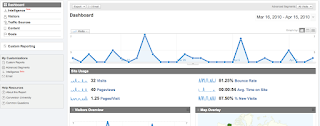
Overview:
Internet marketing tools can be categorized in 3 areas
1. Assessment Tools
2. Promotional Tools
3. Metric or Analytical Tools
This is the time to be in social and Internet marketing. With only 9% of business' using some form of social media (Entrepreneur Magazine April 2010), the opportunity to help business' understand and profit from making a presence is huge.
The actual 'doing' part of social media comes natural to my generation. What I mean by doing is, forming meaningful relationships and utilizing existing Internet tools. These process' have been ingrained in our generation from early on. The trouble I see, not only for myself but also for others who didn't grow up in this technological era, is where to start. This is a common problem and I would like to start by addressing the 3 common Internet marketing tools used in social and Internet marketing: Assessment Tools, Promotional Tools and Metric or Analytical Tools.
Assessment Tools
Assessment tools look at how things are built. They analyze your sites content, meta data, heading and image tags, Interior page analysis, inbound links, promotional tools such as twitter links and much more. Assessment tools, such as Hub Spots website grader can search all these variables as well as compare your site against a competitors. Assessment tools beg the question "How can we make this better and more visible?"
Promotional Tools
Tools that get the word out and boost visibility of your website are categorized as promotional tools. Sites such as stumbleupon.com, digg.com and technorati.com are some of the major players and sites that are must for website owners to submit their site too. Promotional tools beg the question "How can we tell more people about what we are doing?"
Metric or Analytical Tools
There are two widely held theories of the role of marketing and advertising. One side suggests that advertising/marketing must tie directly into sales. The other replies that advertising/marketing need not show a direct relationship because subjective variables such as awareness, brand equity and attitudes cannot be measured. I believe in the latter. However, when trying to convince your boss of the benefits of social media and Internet marketing, she/he may not fully agree and may ask for the ROI or return on investment. This is where metric tools have helped entrepreneurs and employees looking for growth prove these paths are worth the investment.
Metric and analytical tools are good for identifying trends. Such trends could consist of movement of a user throughout your site, landing page behavior and sales funnel behavior. These tools are widely available. For my site, I use Google Analytics. Since Google has over 61% of the market share, I believe it is wiser to be in the market where people are at. Metric tools ask the question, "Are things, in general, doing better or worse?"
Assessment, promotional and metric tools ask the questions, how can we make this better, how can we tell more people about what we are doing and are things doing better overall or worse.
No comments:
Post a Comment